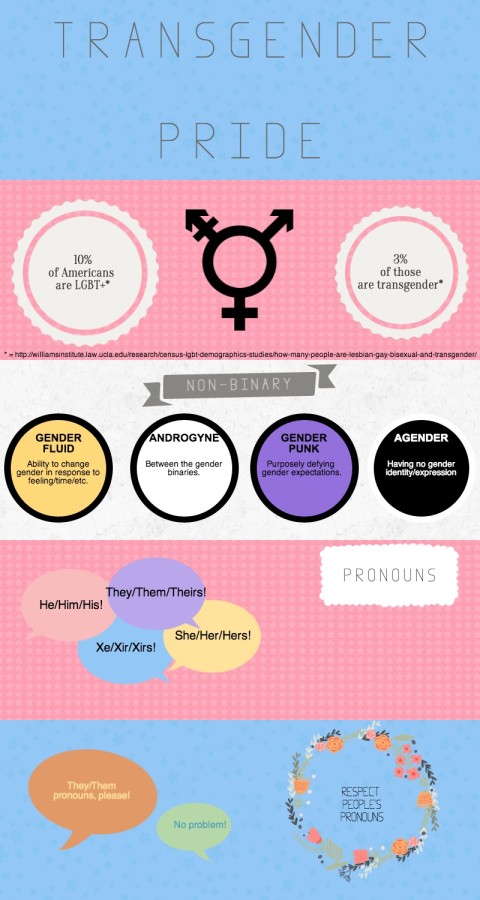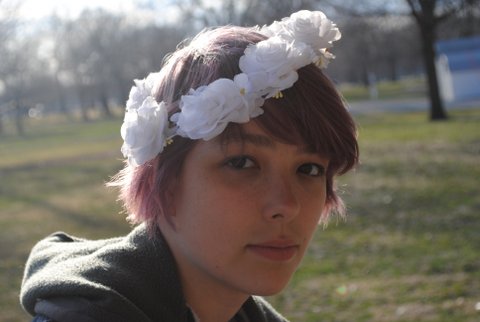Your donation will support the student journalists of Iowa City High School. For 2023, we are trying to update our video and photo studio, purchase new cameras and attend journalism conferences.
He Said, They Said
International Transgender Day of Visibility Sheds Light on the Transgender Community
April 23, 2015
John Jolie Pitt (child of Angelina Jolie and Brad Pitt), Jay Kelly (son of R. Kelly), and Geena Rocero (a model) came out as transgender in 2014. Geena Rocero has been professionally modeling as a female since she was 21, but she came out to the public in a Ted Talk on March 31st, 2014. Jay Kelly admitted that he’d identified as a male since early childhood.
For Liana Gabaldon, ‘16, coming out as transgender was one of the hardest things they had ever done. Gabaldon knew they didn’t want to use feminine pronouns (her/hers), but rather non-gendered ones (they/them).
They knew that their family would accept them, but not how they would react. Fortunately, they were accepted with open arms – which spurred them on to come out to their close friends who were, if not accepting, curious and wanted to learn more.
They agreed to participate as a model for this article to help spread awareness of transgender youth in Iowa City. They own both a corset (a stiff item of clothing that restricts the torso to create a more feminine waistline) and a binder (a clothing item that binds the chest to give the wearer a more masculine torso). The photoshoot featured both items on display to celebrate the International Transgender Day of Visibility (or TDOV).
The International Transgender Day of Visibility is every year on March 31st. Its goal is to raise awareness of the transgender community and their accomplishments. Transgender individuals and communities celebrate it all over the world, by flooding their social media accounts with selfies and transgender positivity.
 Being transgender means that people don’t define themselves by the gender they were born. An example of this would be the famous actress, Laverne Cox. She was born as a male, but identifies as a female. She “transitioned”, which means she underwent a surgery and hormone treatment to biologically change her sex. For her, and many other transgender individuals, a person’s “sex” and a person’s “gender” are two separate things.
Being transgender means that people don’t define themselves by the gender they were born. An example of this would be the famous actress, Laverne Cox. She was born as a male, but identifies as a female. She “transitioned”, which means she underwent a surgery and hormone treatment to biologically change her sex. For her, and many other transgender individuals, a person’s “sex” and a person’s “gender” are two separate things.
The difference between the two might not be apparent to someone who’s never thought about it.
A person’s sex is biological. That is, biologically, having a penis would mean that someone is male, and having a vagina indicates that someone is female. This isn’t always the case for intersex individuals, who may have any combination of female and male reproductive organs.
Gender is more complex. Gender isn’t biological – it’s mental (ask yourself the question, “Do I feel like a boy or a girl?” The answer is your gender.) Some people say that the only genders are male and female, which is also known as the “gender binary.” That’s another way of saying that people can be only one or the other.
Other people describe gender like a spectrum, or that people don’t necessarily have to be a female or male, and might be comfortable somewhere in the middle. People who feel like that often define themselves as “non-binary”. Non-binary is an umbrella term, which means that people don’t define themselves using traditional gender expressions.
Emma Lenz, ‘18, is pre-transition, but feels more comfortable using non-feminine pronouns (they/them).
“People like to put people in boxes and under labels,” Lenz said, on the topic of the gender binary.
They believe that gender is a spectrum, and that gender fluidity is valid.
“A person can be male, female, both, neither, somewhere in between, or their gender could change over time,” Lenz listed.
Transgender and transssexual are often confused with one another, even in the non-binary community. For some people, the phrase “transsexual” is only used for people who’ve gone through a transition or who has been taking hormones.
Zee Fields, ‘18, is another pre-transition student. She prefers feminine pronouns (she/her).
“To me, transgender is identifying as a different gender than you were assigned to at birth… A lot of people told me it was a system shock,” She confessed.
For many teenagers, coming out as transgender may be more difficult than coming out as homosexual. Up until recently, very few media outlets even acknowledged the transgender community, so students like Dulce Escorcia, ‘17, (they/them) have had to explain the ins and outs to their family.
“I’ve talked to relatives and other people about the gender binary… They’re always very interested in what other people identify as, and most of the time they didn’t know those gender identities even existed,” Escorcia explained.
Their family is accepting, but it wasn’t instantaneous.
“Even my mom, who freaked out a little when I showed her my new clothes, has come to to be more okay with more flexible gender,“ Escorcia assured.
For some students, City High has been a safe, accepting place to be themselves.
“I don’t think I could want to be anywhere else,” Zee Fields stated. “Everybody I’ve told or discussed with has supported me completely.”
Escorcia hasn’t had quite as overt displays of confirmation, but they’re accepted as well.
“They don’t say anything good or bad, they just kind of have an, ‘Alright you do that,’ attitude.”
The Transgender Day of Visibility was on March 31st, and it’s likely that, if someone isn’t on social media sites with a large population of non-binary individuals, they might not notice it was going on. However, for people in the know, the holiday was a huge success.
Liana Gabaldon is definitely one of the people in the know, and they made a point of asking everyone they encountered on the 31st what their preferred pronouns are.
“[The Transgender Day of Visibility] was amazing. So many people were showing how they felt on the inside in a physical manifestation… Some of those people may not have been accepted like I have and yet they stood strong and proud.”
Days like TDOV are astronomically helpful, and for much more than just selfie-sharing.
Gabaldon is most moved by the fact that TDOV gives the non-binary community a chance to, “Let the world know that they exist.”
Fields wasn’t aware of the movement until introduced to it by Gabaldon, and she was very happy with the turnout.
“To have any time dedicated to trans awareness is amazing and one more step away from ignorance.”
Unfortunately, not everyone believed the turnout was a success.
Lenz, though a part of the communities where TDOV was taking place, wanted to see more representation from people in the real world.
“I only met 2 people outside of the internet who acknowledged that it was happening.”
Lenz doubted people outside of the community would be as involved as intended.
“If a person is never online they probably wouldn’t have heard about it,” Lenz explained.
One of the most common reasons non-binary people won’t come out to family and friends is the fear of ignorance. They might be afraid that, not only will people not accept them, they’ll say that their thoughts and feelings aren’t valid.
In response, Fields made a comparison.
“Denying someone the right to be themselves is the same as saying, ‘You can’t do this sport or listen to this music.’”
Escorcia had similar thoughts, specifically dealing with empathy.
“Imagine if somebody wanted and made you be a boy even though you see yourself as a girl, or vice-versa. Wouldn’t you feel devastated and frustrated?” They asked. “You don’t have to ‘relate’ in order to support transgender/TDoV, you just need to understand.”
Lastly, the four teens explained what they would say to someone who didn’t feel like they fit their assigned gender.
The common theme throughout advice was to explore – and to take your time!
“Ask yourself why you think you feel this way. Do some research… Take some time to figure out who you are, it could take a while,” Lenz said.
Gabaldon, too, couldn’t stress the importance of exploration enough.
“Explore the internet for information, explore pronouns, explore the way you dress, everything… Never feel bad about your gender, it’s okay to be whoever you want and no one should ever tell you otherwise.”
Fields tacked on another piece of advice.
“Tell people close to you because if they actually care they’ll support you,” She assured.
Escorcia’s mantra, that she said she wanted everyone who was non-binary to remember, was the five words:
“You don’t need to change.”

